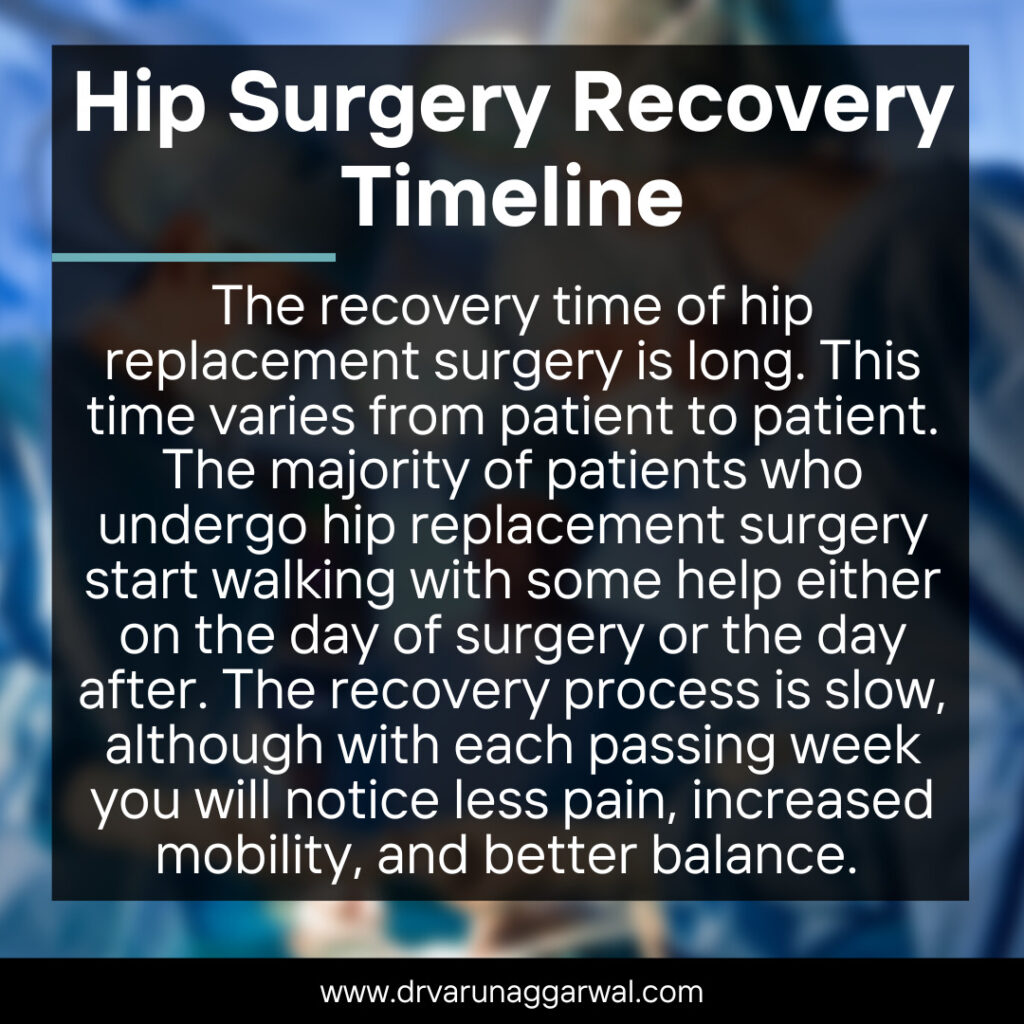A hip replacement may be recommended by your healthcare provider if you suffer from severe hip pain. In this surgery, your hip bone(s) will be replaced with an artificial one, allowing you to move freely and without pain.
The recovery time of hip replacement surgery is long. This time varies from patient to patient. The majority of patients who undergo hip replacement surgery start walking with some help either on the day of surgery or the day after. In this blog, I’ll talk about the recovery timeline of hip replacement surgery. So, keep reading this blog to get a general idea of how your recovery will go after hip replacement surgery.
Hip Surgery Recovery Timeline
The majority of patients recover completely from hip replacement surgery in a few months to a year, although everyone recovers at a different pace. After surgery, you should expect about one to four days of bed rest, but physical rehabilitation generally begins the same day.
The recovery process is slow, although with each passing week you will notice less pain, increased mobility, and better balance.
On the day of surgery
The surgery will take two to three hours, and you will need to rest for about two more hours until the anaesthetic wears off. After surgery, you can expect to get a liquid diet for the rest of the day. A variety of intravenous medications will also be given to prevent blood clots and infections as well as to relieve pain.
One to two days after surgery
The majority of patients should be able to move around with a walker or crutches but will likely need assistance getting out of bed. It’s best to take it slow and move for at least 20 to 30 minutes at a time. This will maintain the strength of your muscles and increase circulation to stop blood clots.
Physical therapists will show you motions that cause less amount of pain, but you won’t be able to move as much as you once could for a few more weeks. The day after surgery, you’ll probably start eating normally again.
Three to four days surgery
You might be able to go to the washroom on your own by day three. Most patients leave the hospital by day three or four if there are no complications.
It will be necessary to have someone drive you home and stay with you for a few days or weeks. Some patients spend some time at a rehabilitation centre before returning home.
Four to ten days after surgery
This period is critical for the prevention of infection. Make sure you follow your doctor’s instructions regarding taking care of the incision. Keep the incision dry. If you experience any symptoms related to the infection, such as fever, redness, or leaking from the incision, let them know right away. Showering or bathing will not be allowed until your surgical staples are removed. The incision can be kept clean with Regular sponge baths.
Physical therapy exercises will improve circulation, prevent stiffness, and speed your recovery if you move about as much as possible and stick to the routine.
Ten to fourteen days after surgery
During this time, your surgeon will remove the staples. After that, you’ll be able to walk without a cane or walker and take showers or baths.
If you are receiving treatment at a rehab facility, you may be able to go home afterwards.
Three to six weeks after surgery
In this period, you can start light exercises and stop getting the help of crutches or a walker. If you are not taking any pain medication, your doctor may also give you the okay to drive again. You can also be able to resume sexual activity around six weeks later surgery.
Ten weeks to an year after surgery
After surgery, many patients resume their regular activities within 10 to 12 weeks, but complete recovery can take six to twelve months. In most cases, the pain diminishes within a year, but some people continue to experience it after that.
The average hip replacement lasts 20 years, however, some implants do fail earlier. Keep an eye out for indications of loosening, instability, infection, or increased pain. These could be symptoms of the implant failing, necessitating hip revision surgery.

The Bottom Line
Hopefully, you got a general idea of how your recovery phase will go on after hip replacement surgery. Following your surgeon’s instructions, keeping an eye out for any issues, being attentive to your physical and occupational therapy, and maintaining a nutritious diet will help you recover from hip replacement surgery more quickly.
Click here to contact for more information


